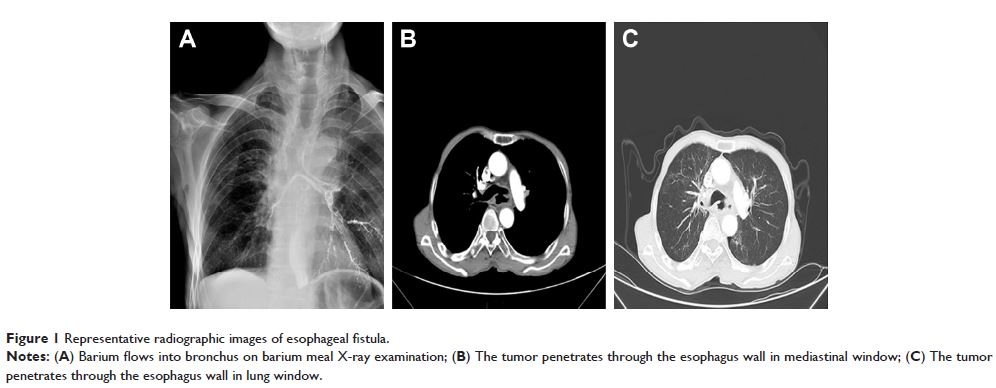108985
论文已发表
注册即可获取德孚的最新动态
IF 收录期刊
- 3.4 Breast Cancer (Dove Med Press)
- 3.2 Clin Epidemiol
- 2.6 Cancer Manag Res
- 2.9 Infect Drug Resist
- 3.7 Clin Interv Aging
- 5.1 Drug Des Dev Ther
- 3.1 Int J Chronic Obstr
- 6.6 Int J Nanomed
- 2.6 Int J Women's Health
- 2.9 Neuropsych Dis Treat
- 2.8 OncoTargets Ther
- 2.0 Patient Prefer Adher
- 2.2 Ther Clin Risk Manag
- 2.5 J Pain Res
- 3.0 Diabet Metab Synd Ob
- 3.2 Psychol Res Behav Ma
- 3.4 Nat Sci Sleep
- 1.8 Pharmgenomics Pers Med
- 2.0 Risk Manag Healthc Policy
- 4.1 J Inflamm Res
- 2.0 Int J Gen Med
- 3.4 J Hepatocell Carcinoma
- 3.0 J Asthma Allergy
- 2.2 Clin Cosmet Investig Dermatol
- 2.4 J Multidiscip Healthc

局部晚期食管癌放化疗患者食管瘘的危险因素
Authors Zhang Y, Li Z, Zhang W, Chen W, Song Y
Received 7 January 2018
Accepted for publication 7 March 2018
Published 23 April 2018 Volume 2018:11 Pages 2311—2317
DOI https://doi.org/10.2147/OTT.S161803
Checked for plagiarism Yes
Review by Single-blind
Peer reviewers approved by Dr Cristina Weinberg
Peer reviewer comments 3
Editor who approved publication: Dr Yao Dai
Background: This
study aimed to investigate risk factors for esophageal fistula in patients with
locally advanced esophageal carcinoma receiving chemoradiotherapy.
Subjects and
methods: The study prospectively enrolled 212
esophageal carcinoma patients undergoing chemoradiotherapy and evaluated 16
clinical parameters. The best cut-off values were determined by receiver
operating characteristics curves. Hazard ratios (HR) and 95% confidence
intervals (CIs) were calculated by the Cox proportional hazards model.
Kaplan–Meier analysis was used to evaluate the cumulative probability.
Results: In total, 22 patients (10.38%) developed esophageal fistula, of whom 9
experienced fistula during treatment and the other 13 patients developed
fistula after chemoradiotherapy. The median time until occurrence was
5.75 months (range 0.6–8 months). In univariate analysis, the evaluated
significant factors were Karnofsky performance status, smoking status,
esophageal stenosis, T stage, fraction dose, and carcinoembryonic antigen
(CEA). In addition, esophageal stenosis (HR=4.089, 95% CI 1.451–11.527, p =0.008), T stage (HR=2.663, 95%
CI 1.019–6.960, p =0.046), and CEA
(HR=0.309, 95% CI 0.124–0.768, p =0.011) were
revealed as risk parameters in further multivariate analysis.
Conclusion: This is the first prospective study to evaluate factors associated
with fistula formation in patients with esophageal carcinoma receiving
chemoradiotherapy. More attention should be given to patients with esophageal
stenosis, stage T4 disease, and high levels of CEA.
Keywords: esophageal fistula, esophageal carcinoma, chemoradiotherapy, side
effect, risk factors
